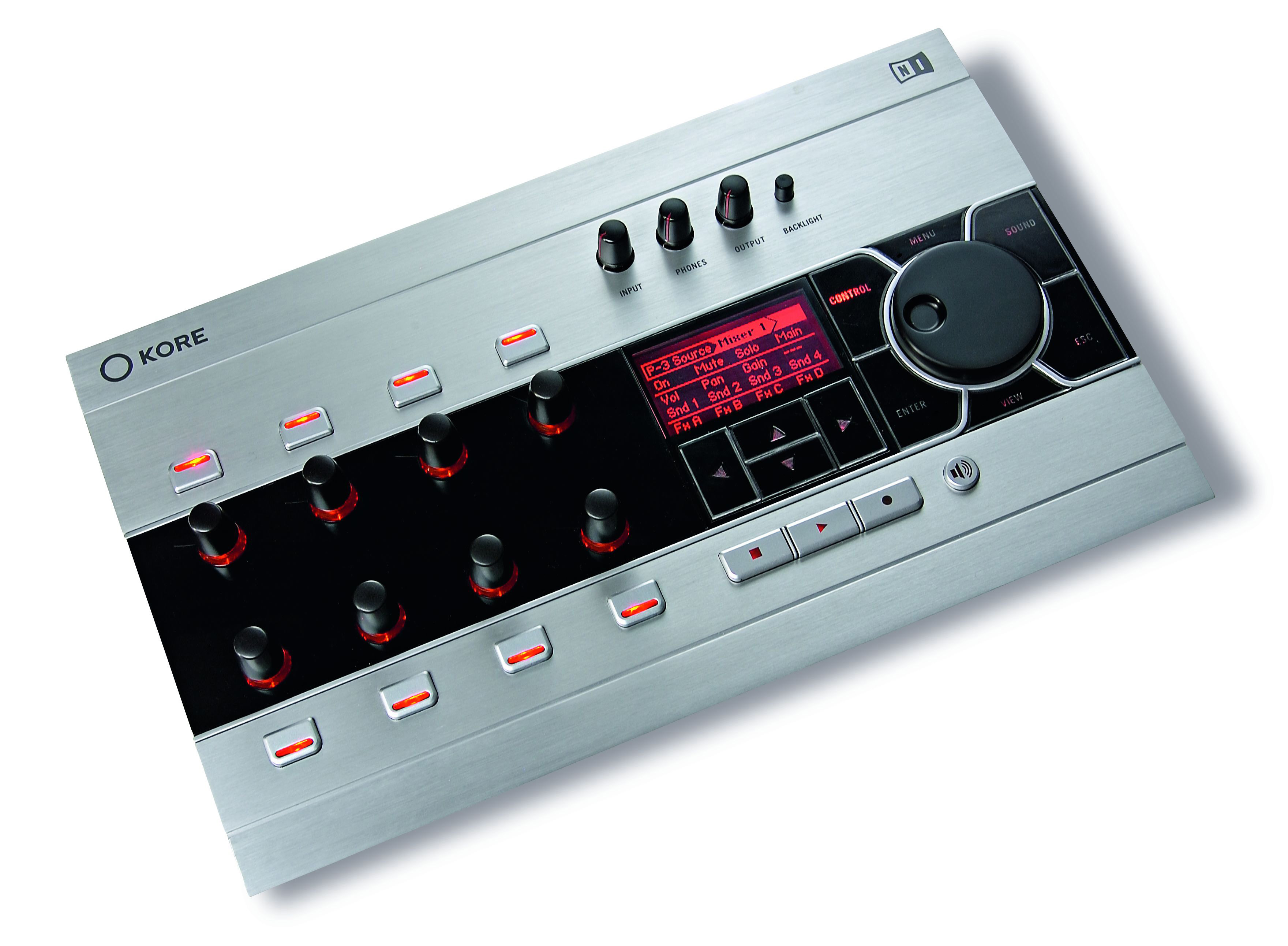MusicRadar Verdict
You might not think that you need it, but Kore will change the way you work. And once you´ve tried it, you´ll never want to be without it.
Pros
- +
A complete sound management and design tool. Effortless browsing of all your sounds. High-precision, hands-on editing.
Cons
- -
Controller unit also functions as a USB dongle. Currently no surround support in the plug-in version.
MusicRadar's got your back


The concept behind Kore actually very simple. Instead of loading your plug-ins into your DAW, you load the Kore plug-in instead.
This contains a database of all your sounds, and when you double-click on one of them, the plug-in that originally created the sound is automatically loaded into Kore and the correct preset selected.
Since Kore is designed to index every sound and effect on your computer network, they're all categorised into 'types' so that you can quickly find what you're looking for.
Hardware
When sounds are loaded, you use the eight knobs and buttons on the hardware controller to adjust their parameters. You might suspect that eight knobs isn't enough, but Kore has a set of four arrow keys that lets you easily navigate through many pages of controller assignments.
Since the bright-orange LCD panel tells you the name of the current page - and which parameters are assigned to the knobs and buttons - there's never any confusion as to what any knob or button will do. When you touch one, it takes over the entire LCD panel, and its value is clearly displayed alongside a horizontal bar.
Kore uses the VST automation system to operate your plug-ins, so the LCD panel typically displays meaningful values such as '3.6KHz', 'Square Wave', or '+12dB'. This is a far cry from some other MIDI controllers, which simply display meaningless numeric data.
Want all the hottest music and gear news, reviews, deals, features and more, direct to your inbox? Sign up here.
Its high-resolution knobs also combine fine adjustment with minimum spin, while faintly-glowing LEDs adorn each active control across the entire panel.
Surrounding Kore's jog wheel is a set of dedicated function keys that enables you to navigate a menu system so comprehensive that you can actually build entirely new sounds from scratch (without having to look at your computer or the mouse).
The system is designed in such a way that if you took Kore on stage, you could quite feasibly perform an entire gig with your laptop folded up and stowed out of the way.
Since the Kore hardware also features a high quality built-in soundcard (with stereo outputs on high-level balanced jack sockets), it looks and behaves like a self-contained synth module.
Although photographs of the Kore hardware suggest that it's a similar shape and size to NI's Rig Kontrol, it's actually much smaller. As such, you'd have no problems fitting it into your gig-bag. It seems robust enough - but then again, but we'll reserve judgement on Kore's road-worthiness until after it's done a few tours of duty.
Software
After installing the software and plugging in the controller, experienced computer musicians should have no problems getting to grips with Kore. Its operation is usually self-evident, and elements of the system that aren't can quickly be discovered through experimentation.
Most plug-ins can be used straight away with Kore, although any creations you've made using modular technology (such as Reaktor and Kontakt) will need automation parameters added or modified in order to expose the controls you want.
Although it should be possible to use any VST or Audio Units plug-in with Kore, those that break programming guidelines can be slightly problematic. The SSL channel strip from Waves, for example, doesn't output any useful parameter display information, so you're left 'flying blind'.
Auditioning sounds with Kore is a breeze, and modifying them is quick and easy.
You can also use Kore to turbo-charge the plug-in handling capabilities of less sophisticated music applications - it will get around artificial limits on the number of insert points you can use on a mixer channel or the number of virtual instruments that you can run simultaneously. You're limited only by the power of your computer.
A fresh approach
Our experience of using Kore has been a thoroughly pleasant one. In comparison, the old way of working - loading plug-ins directly into your host app - feels like getting back in a rusty old car without a safety belt.
Truly, there's nothing else out there that offers anything like the level of functionality and slickness that Kore provides. Elements of its technology exist elsewhere - the Mackie Control Protocol can handle plug-in parameters, and there are some excellent VST rack wrappers (such as Xlutop's Chainer) - but Kore isn't about bits of technology.
No, it's about clever design, integration and giving us back the productivity that got lost when we moved into the virtual world.
It's true that Kore is pricey, but if you make music full-time, the workflow improvements it gives you make the investment worthwhile. If, on the other hand, you make music as a hobby, you'll be delighted to be spending your limited time making music rather than searching for sounds.
For owners of NI's Komplete, Kore could be considered a compulsory purchase, as all 10000 presets are already catalogued into its central database.
MusicRadar is the number 1 website for music makers of all kinds, be they guitarists, drummers, keyboard players, djs or producers...
GEAR: We help musicians find the best gear with top-ranking gear round-ups and high- quality, authoritative reviews by a wide team of highly experienced experts.
TIPS: We also provide tuition, from bite-sized tips to advanced work-outs and guidance from recognised musicians and stars.
STARS: We talk to musicians and stars about their creative processes, and the nuts and bolts of their gear and technique. We give fans an insight into the actual craft of music making that no other music website can.
